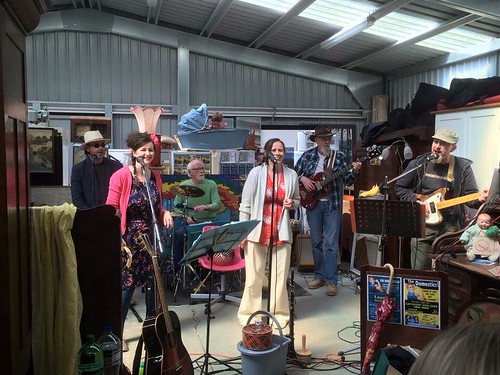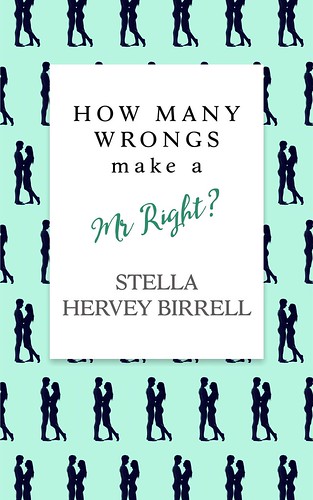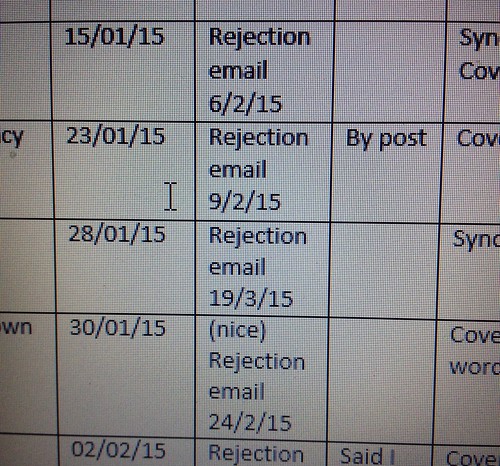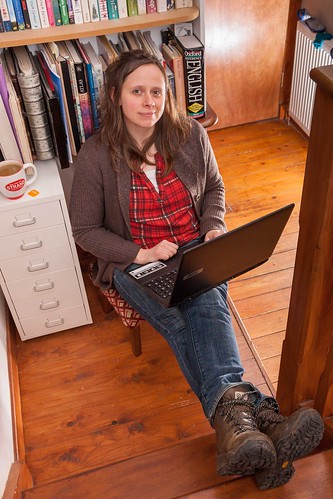How Many Wrongs Make A Mr Right? Debut novelist Stella Hervey Birrell on rejection, writing, and men jumping up and down in nightclubs…
Saturday, April 16th, 2016Hello friends! Remember me? I am indeed still alive, though my blog hardly shows it. Thankfully, I am lucky enough to know the brilliant Stella Hervey Birrell, and even luckier enough to be able to host one of the stops of her blog tour… so I am, rustily, back to blogging! (Thanks, Stella.) Stella’s debut novel is described as “chick lit with grit,” a slogan so great I wish I came up with it — and it’s called How Many Wrong Make A Mr Right? I managed to corner Stella for a small interview… you’re going to enjoy what she has to say, so grab a cuppa and get settled!
1. I’m always interested to hear about how people started out writing. I know that you’re also a singer-songwriter, and wonder — did that come first, then story-writing, or the other way around? Or do you see them as being wholly unconnected?
Not wholly unconnected, no. I had to think really hard about this question: which did come first? It was terribly earnest poetry, really, as a child and then an angsty teenager. Songs have been part of the deal as an adult for a long time, and my husband normally writes the tunes, so it’s something we do together.
But when I gave up work, it wasn’t to write songs, it was so that I could write a commercial, full length novel. Songs are mostly written as gifts, or for my band, The Domestics, which isn’t a full time job.
I’d love to think that writing lyrics informs my prose, but actually I think they’re pretty different. Although it’s probably best that I don’t write in rhyming couplets!

‘And now I will read you my full-length novel…’ Stella with her band, The Domestics. Picture by Caroline Pearson.
2. Kind of related to that first question: what do you think, say, your sixteen-year-old self would make of the fact that you’ve published a novel?
Oh my goodness she’d be delighted! She was so pretentious though, she’d have been super snooty about the fact that I don’t have a traditional, paper based publishing deal, or an agent.
She’d probably be more surprised that I’m a generally happy, settled person though, neither of us thought that would ever happen…

Available on UK Amazon, US Amazon, Kobo, Nook and iBooks. (sorry, 16 year old Stella)
3. What do you see as the major themes of your work? What questions are you interested in exploring? Not necessarily just in your novel, but in your writing in general, I mean. I’m always nosy about the things folk want to drive at with their writing.
At root, I write for women. In my first book, the strongest theme is probably ‘loving yourself first.’
I’m also interested in writing about the female orgasm, in an educational way though – I don’t write erotica.
In other work, women’s empowerment, women’s support networks (good, bad and non-existent), and the whole parenting lark: things I’m experiencing now. For example, my youngest son started school last year, and the piece that came out of the devastation I felt was accepted by the Ropes Journal. Nothing is wasted, as they say.

Melissa, How Many Wrongs Make a Mr Right?
4. I know (*eyebrow-wiggle*) that you’re a member of at least one writer’s group. Can you talk about the ways in which being part of writing community helps or influences your writing?
When I started writing ‘seriously,’ my cousin advised me to join a writers group. I’m so glad she did. Being part of Tyne & Esk Writers means I have a place to read works in progress, the impetus to improve as a writer, a community of writers that I now consider friends, access to a ‘proper’ published author and mentoring from her, a beta-reader who surpasses all other beta-readers, the opportunity to read and comment on other people’s work, and somewhere I go every second Wednesday where I know I’ll have a laugh.
5. If time, money, and lifestyle circumstances were not a factor, what would your writing career look like in 10 years’ time?
In ten years’ time I’d like a readership, not made up of my close family and friends, and a good few novels under my belt. Like about a million other people!
6. I have to do it: what advice can you give to other writers? What have you learned that you wished you knew before you started?
Oooh, advice. Er, no idea. Actually, there have been a few things I didn’t do, because I didn’t think to use Google. For example, I didn’t write a one-line pitch for my debut novel, and at first I didn’t write a good cover email either.
Having short works placed in journals really helps, as you have something to write about in said cover letter. All this advice is online, I wish I’d done my research before going out to agents and publishers! Or read ‘On Writing’ by Stephen King. Especially as one agent emailed me the other day saying she doesn’t accept a second pass, once you’ve been rejected, she’s not interested in looking at future works.

This is part of the deal folks. I love the smell of rejection on a Monday morning…
7. I guess we should devote at least one question to your novel…! What’s your favourite moment in the novel? And was that moment the most fun part to write?
I really like the scene where the ‘gang’ all go dancing. I’m too old for clubbing now, but I used to go out a lot. It was fun, trying to get across the whole club atmosphere: how you lose all your friends but you don’t care, how obvious it is when a guy wants to snog you on the dancefloor, how, when a particular type of song comes on, all the men jump up and down a lot…
8. Finally… what’s next for your writing? Do you have a new novel in progress, or is there something else on the cards for you?
I have a work in progress (The Perfects) which is with my aforementioned beta-reader that surpasses all beta-readers. I am really excited about this second novel, and can’t wait to share it with other people. And I’ve got a sketchy plan for a third too (Having it All). My sisters are slightly nervous about it, because my main characters are two sisters. I’m still submitting short works as and when I can, and blogging twice-weekly.
For me, it’s about keeping going. Helen Fielding said ‘there’s always someone trying to tell you you’re not really a writer,’ and for a long time that person was myself. But with the support of my writing community and the validation of a publishing deal, I’m very nearly convinced.

Trying to act normal while getting your photograph taken, there’s another lifeskill I could do with learning… (Photo: Gordon Bell)
Stella says: “please come and say ‘hi’ in one or more of these places!
My blog space is
https://atinylife140.wordpress.com/
Twitter is @atinylife140
I have a page on Facebook here.
Email me at atinylife140@gmail.com.
I can also be found wandering the streets of various East Lothian villages.”
Thanks, Stella!
*
I wrote a book of poems! It’s called This changes things, and you can order it here!
You can now get more content from me — and help me pay the bills! — by supporting my Patreon. Get a monthly writing support pack for just $5 a month! It’s like buying me a pint.
You can also support me by checking out the many sweet and sparkly things at Edinburgh Vintage, my Etsy-based store for jewellery and small antiques.
If you just want to say hi, you can find me on Twitter, or email me via claire[at]onenightstanzas.com. You’ll get a fairly good sense of the kind of person I am by checking out my Tumblr.


